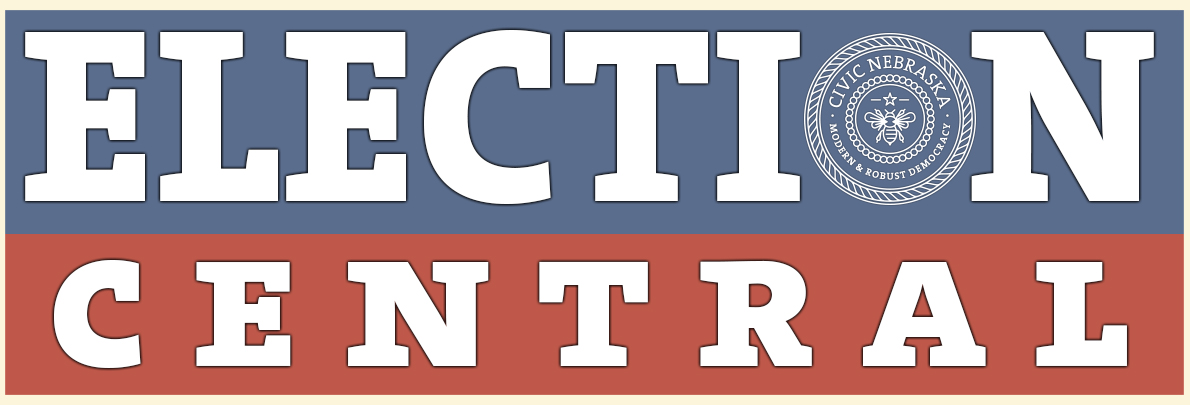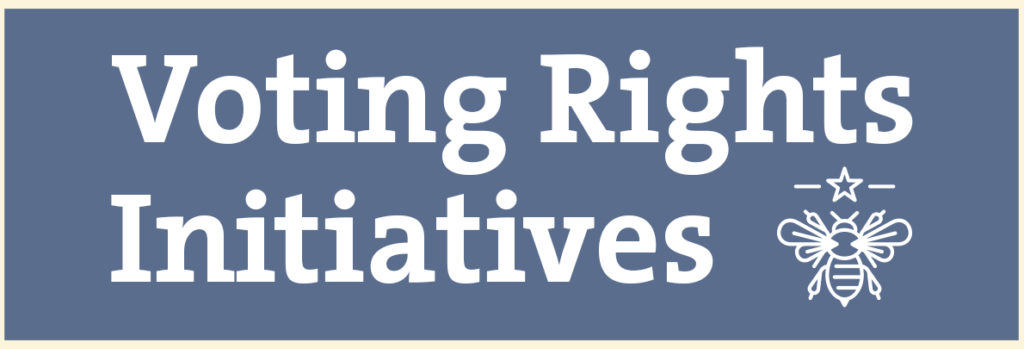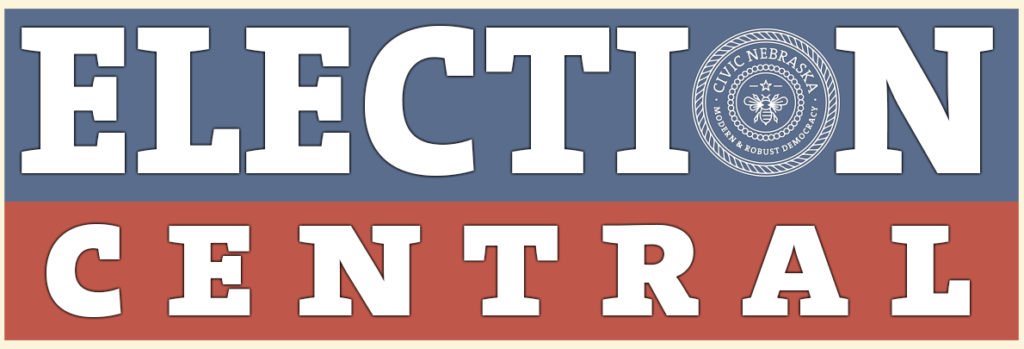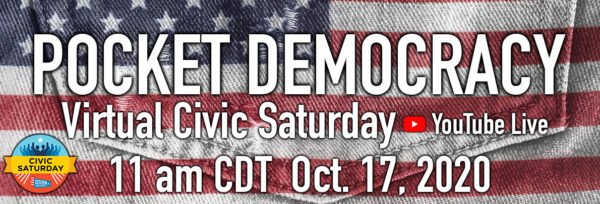Welcome to Decoding the Ballot! This nonpartisan resource from Civic Nebraska explains the roles, responsibilities, and compensation for elected offices on your ballot. There are hundreds of different ballots used in each Nebraska election – they’re all different based on where you live – so we’ve included some of the most common.
Each entry includes a brief description of the office’s responsibilities, term limits, and salary, if applicable. If you would like to further investigate what candidates are on the ballot this year, sample ballots for the 2020 general election are posted at the Secretary of State website. If you have questions or need more information, you can contact our Election Protection Hotline at 402.890.5291, visit Election 2020 Central or email me at john.cartier@civicnebraska.org.
Thank you for being an informed participant in your democracy!

John Cartier, Director of Voting Rights
Federal
Offices
4-year term, $400,000
The president is the chief executive of the United States and commander in chief of the Armed Forces. He or she is responsible for federal administrative and judicial appointments and has the power to sign or veto legislation passed by Congress. The president serves a four-year term, renewable once, and is paid $400,000 per year. He or she is elected alongside the vice president, who serves for the same term at a salary of $235,000 per year.
6-year term, $174,000
The Senate is the upper chamber of the two houses of the United States Congress. Each state elects two senators. Alongside the House of Representatives, the Senate is responsible for creating and passing the country’s laws. Additional powers granted to the Senate include advice and consent — meaning ratification of treaties and confirmation of U.S. Supreme Court justices, cabinet secretaries, ambassadors and other important federal seats. It also has the responsibility of conducting trials after the House begins impeachment procedures.
2-year term, $174,000
Members of the U.S. House of Representatives, also known as The People’s House, are composed of 435 representatives allocated to districts given to a state based on their population. The House has the sole power to draft and introduce bills related to revenue and impeachment cases sent to the Senate. If there is a tie in the election for president, the House has the duty to vote for the next president.
State
Offices
4-year term, limited to two consecutive terms, $12,000
Members of the country’s only unicameral legislative body create laws and make the rules for Nebraskans under certain constitutional limitations. This body also oversees many health care services and decides how much money public schools (from kindergartens to colleges) receive each year. If you are concerned about who pays how much in taxes and how those funds get spent, this is a very important election.
Nonpartisan, 4-year term
The State Board of Education is composed of eight voting members that represent one of Nebraska’s eight educational districts. This board is responsible for creating educational standards and directing state dollars and federal programs for Nebraska’s classrooms. The Board of Education also appoints the commissioner for the Department of Education and carries out federal education programs.
6-year term
The duties of the Board of Regents include providing strategic leadership to the four-institution university system, promoting and advocating for the advancement of the system’s mission of education, research, and outreach. Among its duties is the selection of the system president and approving budgets, and tuition rates. The board is made up of eight voting members.
6-year term, $75,000
Public Service Commission is a constitutionally created executive body comprised of five seats including one chairperson. This commission is responsible for regulating telecommunications carriers, natural gas jurisdictional utilities, major oil pipelines, railroad safety, household goods movers and passenger carriers, grain warehouses and dealers, construction of manufactured and modular homes and recreational vehicles, high-voltage electric transmission lines, and private water company rates. The Commission also oversees and administers the Nebraska Universal Service Fund the Enhanced Wireless 911 Fund, and the Nebraska Telecommunications Relay System Fund.
Local
Offices
4-year term
Depending on where you live, you may have a Community College Board of Governors race. The board manages a community college’s staff and professors. It also develops its education programs based on its community’s needs. This includes setting tuition prices, setting the college’s budget, and deciding the amount that may be collected from your property tax bill.
4-year term
The Learning Community works in Douglas and Sarpy counties to help develop school programs that reverse the impact of poverty on learning. This used to be funded by a common levy but is now funded by property taxes.
4-year term
The Nebraska Association of Resource Districts is governed by a 23-member Board of Directors, each representing a natural resource district. The NRD Board of Directors decides how much is collected from your property tax bill for the NRD and uses that money for projects such as building dams, drainage ditches, flood control, and recreation trails. NRDs are also responsible for preserving and protecting groundwater and other natural resources for future generations.
Metropolitan Utilities District of Omaha: 6-year term
The Metropolitan Utilities District of Omaha is a public utility that is customer-owned. The district provides public gas and drinking water to Omaha and the surrounding area. The Board of Directors sets rates & ensures water meets or exceeds all state and federal standards for drinking water. The district is governed by an elected board of 7 directors who serve 6-year terms.
6-year term
Nebraska is unique for being the only state where electrical needs are provided by publicly-owned utilities, which are largely known as public power districts. Depending on where you live, you may have a race to fill a seat on a board that serves one of the 166 community-owned utilities in Nebraska. Individuals elected to serve on a Board of Directors for a public power district will set the rates for residents and make decisions about investments in future energy sources.
6-year term
Reclamation Districts provide for the conservation of the water resources of the State of Nebraska and for the greatest beneficial use of water within the state, organization of reclamation districts and the construction of works that are declared by such districts as a public use and will.
4-year term
Educational Service Units (ESUs) are political subdivisions that serve schools within their county-defined area by creating programs to support teachers and students. Core services provided by ESUs (in order of priority) are: staff development related to helping students achieve success who are impoverished and/or who come from diverse backgrounds; technology that helps assist distance education services; and providing instructional material services. ESUs may receive funds from local property taxes.
Ballot
Initiatives
Appears on all state ballots. Sponsors collected sufficient signatures to bring the following initiatives before the voters.
Shall Nebraska statutes be amended to: (1) reduce the amount that delayed deposit services licensees, also known as payday lenders, can charge to a maximum annual percentage rate of thirty-six percent; (2) prohibit payday lenders from evading this rate cap; and (3) deem void and uncollectable any delayed deposit transaction made in violation of this rate cap?
A vote “FOR” will amend Nebraska statutes to: (1) reduce the amount that delayed deposit services licensees, also known as payday lenders, can charge to a maximum annual percentage rate of thirty-six percent; (2) prohibit payday lenders from evading this rate cap; and (3) deem void and uncollectable any delayed deposit transaction made in violation of this rate cap. A vote “AGAINST” will not cause the Nebraska statutes to be amended in such manner.
Shall the Nebraska Constitution be amended to state that laws may be enacted to provide for the authorization, regulation, and taxation of all forms of games of chance to be conducted by licensees within licensed racetrack enclosures in Nebraska?
A vote “FOR” will amend the Nebraska Constitution to state that laws may be enacted to provide for the authorization, regulation, and taxation of all forms of games of chance to be conducted by licensees within licensed racetrack enclosures in Nebraska. A vote “AGAINST” will not cause the Nebraska Constitution to be amended in such manner.
Shall a statute be enacted which: (1) allows games of chance to be conducted by authorized gaming operators within licensed racetrack enclosures in Nebraska; (2) establishes a Nebraska Gaming Commission to license and regulate such gaming; and (3) amends and repeals existing sections of law to harmonize provisions consistent with the enactment of such statute?
A vote “FOR” will enact a statute which: (1) allows games of chance to be conducted by authorized gaming operators within licensed racetrack enclosures in Nebraska; (2) establishes a Nebraska Gaming Commission to license and regulate such gaming; and (3) amends and repeals existing sections of law to harmonize provisions consistent with the enactment of such statute. A vote “AGAINST” will not cause such a statute to be enacted.
Shall a statute be enacted which: (1) imposes a 20% annual tax on gross gaming revenue from games of chance operated at licensed racetrack locations; (2) distributes 75% of such gaming tax revenues to the State for credit of 2.5% to both the Compulsive Gamblers Assistance Fund and General Fund, and 70% to the Property Tax Credit Cash Fund; and (3) distributes 25% of such gaming tax revenues to the county where the licensed racetrack is located, or, if the racetrack is located partially within a city or village, distributes this percentage evenly between the county and city or village?
A vote “FOR” will enact a statute which: (1) imposes a 20% annual tax on gross gaming revenue from games of chance operated at licensed racetrack locations; (2) distributes 75% of such gaming tax revenues to the State for credit of 2.5% to both the Compulsive Gamblers Assistance Fund and General Fund, and 70% to the Property Tax Credit Cash Fund; and (3) distributes 25% of such gaming tax revenues to the county where the licensed racetrack is located, or, if the racetrack is located partially within a city or village, distributes this percentage evenly between the county and city or village. A vote “AGAINST” will not cause such a statute to be enacted.
Constitutional Amendments
Appears on all state ballots. The Nebraska Legislature approved putting the following amendments before the voters.
A constitutional amendment to eliminate slavery or involuntary servitude as a punishment for crime.
A vote FOR this constitutional amendment would eliminate a provision in the Nebraska Constitution that states that slavery or involuntary servitude may be used as a punishment for conviction of a crime. A vote AGAINST this constitutional amendment would leave the language regarding slavery or involuntary servitude unchanged in the Nebraska Constitution.
A constitutional amendment to authorize the Legislature to allow cities and villages to pledge property taxes as part of a redevelopment project for a period not to exceed twenty years if, due to a high rate of unemployment combined with a high poverty rate as determined by law, more than one -half of the property in the project area is extremely blighted.
A vote FOR this constitutional amendment would amend the Nebraska Constitution to authorize the Legislature to extend the maximum length of time for the repayment of indebtedness related to tax-increment financing from 15 years to 20 years if more than one-half of the property in the project area is designated as extremely blighted. A vote AGAINST this constitutional amendment would leave the maximum length of time for repayment of indebtedness unchanged at 15 years.
Judicial
Retentions
Judges must run for retention in the first general election occurring more than three years after appointment.
6-year term
The Supreme Court consists of a Chief Justice and six associate justices. The Chief Justice, who represents the state at large, is appointed by the Governor from a statewide list of candidates selected by a judicial nominating commission. The six remaining associate justices are chosen by the same judicial nominating commission procedure but each represents one of six districts. These judicial districts are approximately equal in population and are redistricted by the Legislature after each census.
Judges who wish to retain their seats must run for retention in the first general election occurring more than three years after appointment. Judges are then subject to retention every six years. Voters are asked to answer the question, “Shall Judge___________be retained in office?” To remove a judge, more than 50 percent of voters must indicate they do not want the judge to be retained.
Judge of the Court of Appeals: 6-year term
The Court of Appeals consists of six judges appointed by the Governor from lists submitted by judicial nominating commissions. From the six judges, a chief judge is selected to serve a 2-year renewable term. The districts from which the Court of Appeals judges are appointed are the same as those used for the six Supreme Court justices. The Court of Appeals is divided into two panels consisting of three judges each. The panels decide separate cases to expedite the processing of appeals. The composition of the panels changes periodically so that all the judges work with each other at some time.
6-year term
The Workers’ Compensation Court administers and enforces all provisions of the Nebraska Workers’ Compensation Act, which includes original jurisdiction of all claims for workers’ compensation benefits resulting from occupational injuries or illnesses. All industrial accidents are required to be reported to this court.
6-year term
The district courts are Nebraska’s general jurisdiction trial courts. This means that with a few exceptions, civil and criminal cases of all types may be commenced in and tried by the district courts. District courts also function as appellate courts in deciding appeals from various administrative agencies and from most county court cases. When acting as an appellate court, a district judge reviews the record of testimony and evidence from the county court or administrative agency in order to rule on the appeal.
6-year term
Nebraska has three separate juvenile courts located in Douglas, Lancaster, and Sarpy Counties. In the remaining counties, juvenile matters are heard in the county courts. Separate juvenile courts are courts of record and handle matters involving neglected, dependent, and delinquent children. The court also has jurisdiction in domestic relations cases where the care, support, or custody of minor children is an issue. The three separate juvenile courts have the same jurisdiction and employ the same procedures as the county courts acting as juvenile courts.
6-year term
The county courts are trial courts with specified limited jurisdiction. All small claims, probate, guardianship, conservatorship, adoption, and municipal ordinance violation cases are filed in the county courts. Except in Douglas, Lancaster, and Sarpy Counties, where juvenile cases are handled by Separate Juvenile Courts, most juvenile matters are handled by the county courts. County courts conduct preliminary hearings in felony criminal cases. The county courts have concurrent jurisdiction with the district courts in some divorce cases and other civil cases involving $57,000 or less. They also have concurrent jurisdiction with the district court in misdemeanor criminal and traffic infraction cases, but nearly all of those cases are prosecuted in the county courts.
Latest Voting Rights News
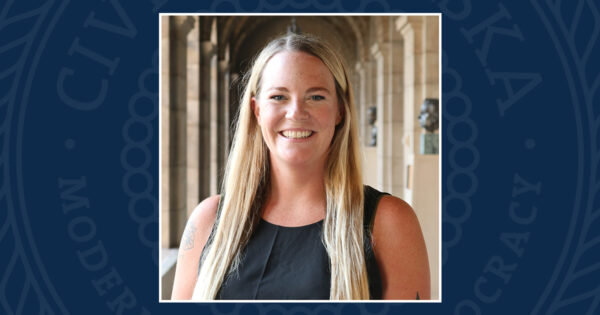
Meet Lily Sughroue, director of civic health programs
The Lincolnite brings her community-building and program-growing expertise to Civic Nebraska.
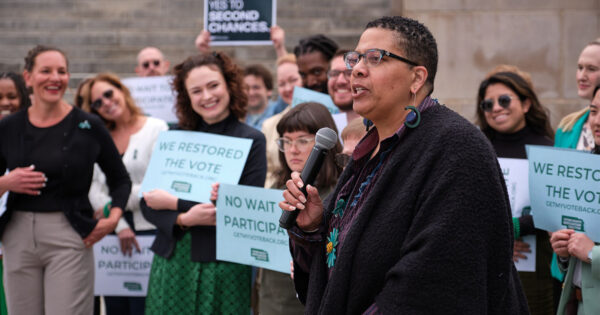
‘Get My Vote Back’ campaign launched
The law goes into effect July 18.
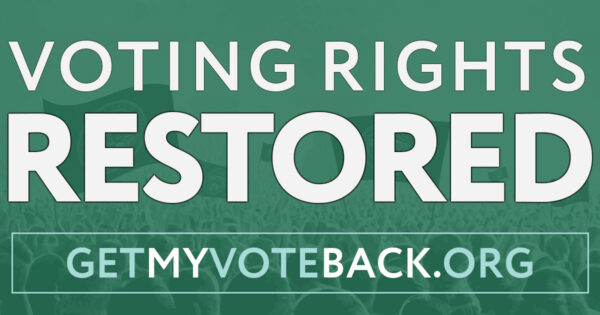
Voting rights restored! LB20 passes into law
Following the passage of LB20, which removes the extra two-year waiting period for Nebraskans who have completed a felony sentence to vote, Nebraska’s Voting Rights Restoration Coalition issued the following statement.

The 2024 Summer of Democracy Reading List: Let’s get your picks!
We invite readers to submit their suggested titles for this year’s reading list by Friday, May 17, 2024.

Democracy begins in discussion
It’s National Week of Conversation in the United States. So let’s get to it.
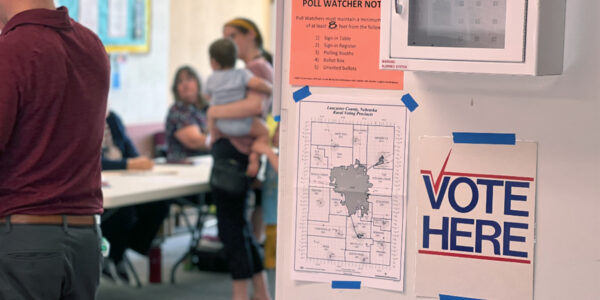
Be a poll worker on Election Day
Several Nebraska counties are still seeking election workers to staff their polling places.
